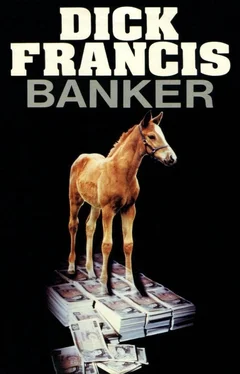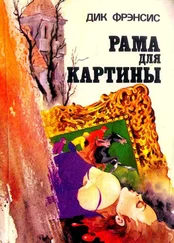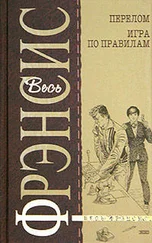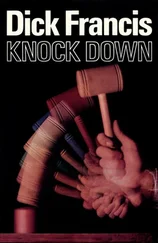‘She’s where?’ Oliver said loudly, plainly, in alarm. ‘Where?’
I went quickly into the hallway. One of the lads stood in the open doorway, panting for breath, wide-eyed and looking very scared.
Oliver glanced at me over his shoulder, already on the move.
‘He says Ginnie’s lying on the ground unconscious.’
The lad turned and ran off, with Oliver following and myself close behind: and the lad’s breathlessness, I soon found, was owing to Ginnie’s being on the far side of the farm, away down beyond Nigel’s bungalow and the lads’ hostel, right down on the far drive, near the gate to the lower road.
We arrived there still running, the lad now doubling over in his fight for breath, and found Ginnie lying on her side on the hard asphalt surface with another of the lads on his knees beside her, dim figures in weak moonlight, blurred outlines of shadow.
Oliver and I too knelt there and Oliver was saying to the lads, ‘What happened, what happened? Did she fall?’
‘We just found her,’ the kneeling lad said. ‘We were on our way back from the pub. She’s coming round, though, sir, she’s been saying things.’
Ginnie in fact moved slightly, and said ‘Dad.’
‘Yes, Ginnie, I’m here.’ He picked up her hand and patted it. ‘We’ll soon get you right.’ There was relief in his voice, but short-lived.
‘Dad,’ Ginnie said, mumbling. ‘Dad.’
‘Yes, I’m here.’
‘Dad...’
‘She isn’t hearing you,’ I said worriedly.
He turned his head to me, his eyes liquid in the dark of his face. ‘Get an ambulance. There’s a telephone in Nigel’s house. Tell him to get an ambulance here quickly. I don’t think we’ll move her.... Get an ambulance.’
I stood up to go on the errand but the breathless lad said, ‘Nigel’s out. I tried there. There’s no one. It’s all locked.’
‘I’ll go back to the house.’
I ran as fast on the way back and had to fight to control my own gulping breaths there to make my words intelligible. ‘Tell them to take the lower road from the village... the smaller right fork... where the road divides. Nearly a mile from there... wide metal farm gate, on the left.’
‘Understood,’ a man said impersonally. ‘They’ll be on their way.’
I fetched the padded quilt off my bed and ran back across the farm and found everything much as I’d left it. ‘They’re coming,’ I said. ‘How is she?’
Oliver tucked the quilt round his daughter as best he could. ‘She keeps saying things. Just sounds, not words.’
‘Da—’ Ginnie said.
Her eyelids trembled and slightly opened.
‘Ginnie,’ Oliver said urgently. ‘This is Dad.’
Her lips moved in a mumbling unformed murmur. The eyes looked at nothing, unfocussed, the gleam just reflected moonlight, not an awakening.
‘Oh God,’ Oliver said. ‘What’s happened to her? What can have happened?’
The two lads stood there, awkward and silent, not knowing the answer.
‘Go and open the gate,’ Oliver told them. ‘Stand on the road. Signal to the ambulance when it comes.’
They went as if relieved; and the ambulance did come, lights flashing, with two brisk men in uniform who lifted Ginnie without much disturbing her onto a stretcher. Oliver asked them to wait while he fetched the Land Rover from Nigel’s garage, and in a short time the ambulance set off to the hospital with Oliver and me following.
‘Lucky you had the key,’ I said, indicating it in the ignition. Just something to say: anything.
‘We always keep it in that tin on the shelf.’
The tin said ‘Blackcurrant Coughdrops. Take as Required.’
Oliver drove automatically, following the rear lights ahead. ‘Why don’t they go faster?’ he said, though their speed was quite normal.
‘Don’t want to jolt her, perhaps.’
‘Do you think it’s a stroke?’ he said.
‘She’s too young.’
‘No. I had a cousin... an aneurysm burst when he was sixteen.’
I glanced at his face: lined, grim, intent on the road.
The journey seemed endless, but ended at a huge bright hospital in a sprawling town. The men in uniform opened the rear doors of the ambulance while Oliver parked the Land Rover and we followed them into the brightly lit emergency reception area, seeing them wheel Ginnie into a curtained cubicle, watching them come out again with their stretcher, thanking them as they left.
A nurse told us to sit on some nearby chairs while she fetched a doctor. The place was empty, quiet, all readiness but no bustle. Ten o’clock on Sunday night.
A doctor came in a white coat, stethoscope dangling. An Indian, young, black-haired, rubbing his eyes with forefinger and thumb. He went behind the curtains with the nurse and for about a minute Oliver clasped and unclasped his fingers, unable to contain his anxiety.
The doctor’s voice reached us clearly, the Indian accent making no difference.
‘They shouldn’t have brought her here,’ he said. ‘She’s dead.’
Oliver was on his feet, bounding across the shining floor, pulling back the curtains with a frantic sweep of the arm.
‘She’s not dead. She was talking. Moving. She’s not dead.’
In dread I followed him. She couldn’t be dead, not like that, not so fast, not without the hospital fighting long to save her. She couldn’t be.
The doctor straightened up from bending over her, withdrawing his hand from under Ginnie’s head, looking at us across the small space.
‘She’s my daughter,’ Oliver said. ‘She’s not dead.’
A sort of weary compassion drooped in the doctor’s shoulders. ‘I am sorry,’ he said. ‘Very sorry. She is gone.’
‘No!’ The word burst out of Oliver in an agony. ‘You’re wrong. Get someone else.’
The nurse made a shocked gesture but the young doctor said gently, ‘There is no pulse. No heartbeat. No contraction of the pupils. She has been gone for perhaps ten minutes, perhaps twenty. I could get someone else, but there is nothing to be done.’
‘But why?’ Oliver said. ‘She was talking.’
The dark doctor looked down to where Ginnie was lying on her back, eyes closed, brown hair falling about her head, face very pale. Her jerseys had both been unbuttoned for the stethoscope, the white bra showing, and the nurse had also undone the waistband of the skirt, pulling it loose. Ginnie looked very young, very defenceless, lying there so quiet and still, and I stood numbly, not believing it, unable, like Oliver, to accept such a monstrous change.
‘Her skull is fractured,’ the doctor said. ‘If she was talking, she died on the way here, in the ambulance. With head injuries it can be like that. I am sorry.’
There was a sound of an ambulance’s siren wailing outside, and sudden noise and rushing people by the doors where we had come in, voices raised in a jumble of instructions.
‘Traffic accident,’ someone shouted, and the doctor’s eyes moved beyond us to the new need, to the future, not the past.
‘I must go,’ he said, and the nurse, nodding, handed me a flat white plastic bottle which she had been holding.
‘You may as well take this,’ she said. ‘It was tucked into the waistband of her skirt, against the stomach.’
She made as if to cover Ginnie with a sheet, but Oliver stopped her.
‘I’ll do it,’ he said. ‘I want to be with her.’
The young doctor nodded, and he and I and the nurse stepped outside the cubicle, drawing the curtains behind us. The doctor looked in a brief pause of stillness towards the three or four stretchers arriving at the entrance, taking a breath, seeming to summon up energy from deep reserves.
‘I’ve been on duty for thirty hours,’ he said to me. ‘And now the pubs are out. Ten o’clock, Sundays. Drunk drivers, drunk pedestrians. Always the same.’
Читать дальше




